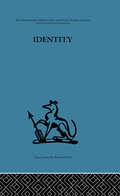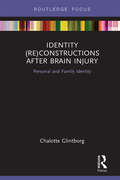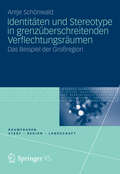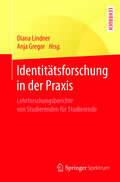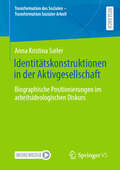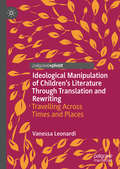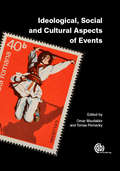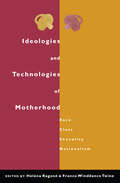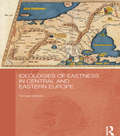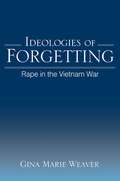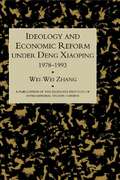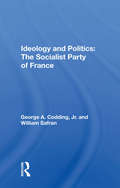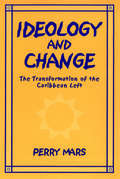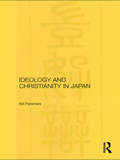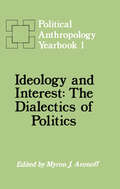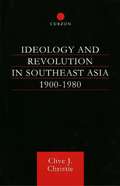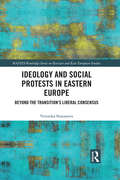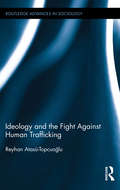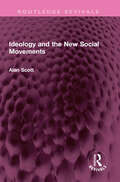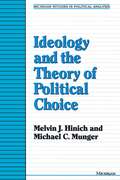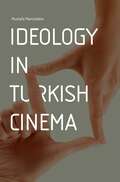- Table View
- List View
Identity: Mental health and value systems
by Kenneth SoddyTavistock Press was established as a co-operative venture between the Tavistock Institute and Routledge & Kegan Paul (RKP) in the 1950s to produce a series of major contributions across the social sciences. This volume is part of a 2001 reissue of a selection of those important works which have since gone out of print, or are difficult to locate. Published by Routledge, 112 volumes in total are being brought together under the name The International Behavioural and Social Sciences Library: Classics from the Tavistock Press. Reproduced here in facsimile, this volume was originally published in 1961 and is available individually. The collection is also available in a number of themed mini-sets of between 5 and 13 volumes, or as a complete collection.
Identity: Personal and Family Identity (Interdisciplinary Disability Studies)
by Chalotte GlintborgIdentity (Re)constructions After Brain Injury: Personal and Family Identity investigates how being diagnosed with acquired brain injury (ABI) impacts identity (re)construction in both adults with ABI and their close relatives. To show how being diagnosed with ABI impacts identity (re)construction, this book investigates key patterns of identity construction. Discourse analysis, especially on the concept of positioning, provides an understanding of the changes and developmental processes in these self-narratives. These narrative (re)constructions point to a developmental change of identity in the course of the different phases of the recovery process for both persons with ABI and their relatives, including conflicting voices from society, service providers, relatives, and other adults with ABI. In addition, the (re)construction process is characterized by much ambivalence in both ABI survivors and relatives. Three perspectives are triangulated: (1) an insider perspective from ABI survivors; (2) an insider perspective from relatives; and (3) an outsider perspective from the researchers. This allows us to see how identities are negotiated and constructed in concrete situations. This innovative book will be required reading for all students and academics working in the fields of disability studies, rehabilitation psychology, sociology, allied health, and social care.
Identitäten und Stereotype in grenzüberschreitenden Verflechtungsräumen
by Antje SchönwaldAnhand von qualitativen Interviews mit Akteuren des grenzüberschreitenden Verflechtungsraums Großregion untersucht Antje Schönwald Identitäten und Stereotype sowie deren Auswirkungen auf das Handeln jenseits traditioneller Raumvorstellungen. Die Autorin analysiert Entstehung und Folge von Kategorisierungen in der grenzüberschreitenden Kooperation und das Verhältnis von Selbst- und Fremddarstellung. Außerdem nimmt sie eine Typisierung großregionaler Identitäten vor.Anhand von qualitativen Interviews mit Akteuren des grenzüberschreitenden Verflechtungsraums Großregion untersucht Antje Schönwald Identitäten und Stereotype sowie deren Auswirkungen auf das Handeln jenseits traditioneller Raumvorstellungen. Die Autorin analysiert Entstehung und Folge von Kategorisierungen in der grenzüberschreitenden Kooperation und das Verhältnis von Selbst- und Fremddarstellung. Außerdem nimmt sie eine Typisierung großregionaler Identitäten vor.
Identitätsarbeit beim Übergang in die Pension: Prozesse und Inhalte der prospektiven Auseinandersetzung mit Identitätsentwürfen und die Bedeutung der individuellen Kapitalausstattung (Vechtaer Beiträge zur Gerontologie)
by Julia ReinerAngesichts des Spannungsfelds aus Gewinnen und Verlusten, neuen Gestaltungsfreiheiten und -notwendigkeiten kann der Übergang in die Pension als besonders sensible Phase für Identitätsarbeit erachtet werden. Dies gilt speziell für die zukunftsorientierte Auseinandersetzung mit Identitätsentwürfen im Sinne von prospektiver Identitätsarbeit. Im Rahmen einer mehrphasigen Mixed-Methods-Studie untersucht Julia Reiner Prozesse und Inhalte von prospektiver Identitätsarbeit beim Übergang in die Pension und stellt in diesem Zusammenhang auch die Frage nach der Bedeutung der individuellen Kapitalausstattung. Durch die Verschränkung unterschiedlicher theoretischer Perspektiven und deren empirische Bearbeitung leistet die Untersuchung einen wertvollen Beitrag für die Identitäts- und Pensionierungsforschung sowie für Fragen sozialer Ungleichheit in diesen beiden Forschungsfeldern.
Identitätsforschung in der Praxis
by Diana Lindner Anja GregorIn vier Kapiteln bietet das Buch einen Überblick über aktuelle Themen der Identitätsforschung. Die Auswahl an qualitativen, empirischen Forschungsberichten reicht von der Analyse narrativer Identität, über Biographieforschung zur Asexualität und Grounded Theory zur religiösen Vergemeinschaftung bis hin zu einer Gruppendiskussion über Stigmatisierungserfahrungen bei Muslimen. Methodisch kamen zwei Interviewstudien, eine Ethnografie und eine Gruppendiskussion zur Anwendung. LeserInnen erfahren, wie ein Forschungsbericht aussehen kann, welche Ergebnisse in der Kürze der Zeit von einer Gruppe von Forschungsneulingen erzielt werden können und was alles bei so einem Projekt zu bedenken ist. Studierende lernen aber nicht nur, eine Lehrforschung zu planen, durchzuführen und zu schreiben, sie bekommen auch Einblick in klassische Identitätstheorien sowie aktuelle und einzigartige Studien im Bereich der Identitätsforschung. Dieses Buch ist von Bachelor-Studierenden der Soziologie geschrieben und bietet Neulingen auf dem Gebiet der qualitativen Sozialforschung Orientierung und wertvolle Tipps für die Umsetzung des ersten eigenen Forschungsprojekts. Zugleich ist das Buch für all jene lesenswert, die sich mit neuen Erkenntnissen aus dem Bereich der Identitätsforschung vertraut machen wollen.
Identitätskonstruktionen in der Aktivgesellschaft: Biographische Positionierungen im arbeitsideologischen Diskurs (Transformation des Sozialen – Transformation Sozialer Arbeit #10)
by Anna Kristina SailerAnna Kristina Sailer nimmt auf Basis einer narrativen Analyse die Identitätskonstruktionen junger Erwachsener in der Aktivgesellschaft in den Blick. Der Begriff der Aktivgesellschaft umschreibt dabei das veränderte Verhältnis von Individuum und Erwerbsarbeit. Dabei geht die Autorin davon aus, dass sich durch die aktivierende Arbeitsmarktpolitik eine arbeitsideologische Zuspitzung ergeben hat, die sich sowohl in einem verschärften Diskurs als auch in den Identitätskonstruktionen der jungen Erwachsenen widerspiegelt. Diskurs, Ideologie und Identität werden dabei als wechselseitige Konstitutionsbedingungen verstanden, denn vor dem Hintergrund des arbeitsideologischen Diskurses positionieren junge Erwachsene sich selbst und andere und werden zugleich von anderen (fremd)positioniert. Die Zielgruppe der jungen Erwachsenen ist dabei besonders von arbeitsideologischen Anrufungen betroffen, da sie in der Statuspassage des beruflichen Übergangs von der (Hoch)schule in den Beruf ihre Aktivierung und Eigenverantwortung in besonderer Weise unter Beweis stellen muss. Durch eine Kombination von biographischen Fallrekonstruktionen und Metaphernanalysen verdeutlicht die Autorin in ihrer Studie, wie sich junge Erwachsene im biographischen Interview im Sprechen mit arbeitsideologischen Diskursen vernähen, wenn sie Identität konstruieren und zeigt dabei auf, wie arbeitsideologische Anrufungen letztlich auch die Handlungsfähigkeit junger Erwachsener in der Aktivgesellschaft beeinflussen.
Identité, appartenances: Un parcours franco-ontarien (Essais et fiction)
by Robert MajorThis book examines the Franco-Ontarian reality through the telling of an individual journey, that is representative of a generation. This account integrates autobiography, reflection, readings and research. A contemplation on the University of Ottawa and its historical role, which is the culmination of this particular journey, is the primary theme of the book.Its fundamental question: what does it mean to be Franco-Ontarian? Does it still make sense to hold on to a particular collective identity? Identities are often deadly, unfortunately, as history reveals. In the absolute, we are all human, brothers and sisters, fragile, destined for certain death, dust in the infinite, insignificant in space-time. "What is a man in infinity?" Pascal would have said. Why, then, should we cling to our particularities, drape them over ourselves with pride, or brandish them as banners? It's to glory in the accidents of one's selfhood, the chance of one's birth, the contingencies of one's true nature, that of being a human among other humans.And yet, nothing can be done about it. We can't choose our roots: they were there before we were born, and they pushed us towards the light. Everyone comes from a family, a group, a space, a culture, a people, and a nation. For we are not abstractions, nor pure spirits. We are embodied in a collective. The individual carries the group within him, and vice versa. With all the wealth and suffering that entails.
Ideological Manipulation of Children’s Literature Through Translation and Rewriting: Travelling Across Times and Places
by Vanessa LeonardiThis book explores the topic of ideological manipulation in the translation of children’s literature by addressing several crucial questions, including how target language norms and conventions affect the quality of a translation, how translations are selected on the basis of what is culturally accepted, who is involved in the selection of what should be translated for children in the target culture, and how this process takes place. The author presents different ways of looking at the translation of children’s books, focusing particularly on the practices of intralingual and interlingual translations as a form of rewriting across a selection of European languages. This book will be of interest to Translation Studies and children's literature scholars, as well as those with a wider interest in the impact of ideology on culture.
Ideological, Social and Cultural Aspects of Events
by Omar Moufakkir Tomas PerneckyThere is an ever growing importance of events in modern society and until now existing literature on events has been dominated by the economic perspective. Social and Cultural Aspects of Events addresses the social and cultural side of events and explores the role they have in fostering change and community development. It examines the transformatory function of events in the context of development studies - as phenomena that can promote and facilitate human development, including social, societal and individual change. This book provides vital and timely exploration and encourages the study of more diverse themes within event management.
Ideologies and Technologies of Motherhood: Race, Class, Sexuality, Nationalism
by France Winddance Twine Heléna RagonéIdeologies and Technologies of Motherhood charts new territory by exploring the notion of motherhood for women of differing classes, races, religions and nations in the light of various strategies and new technologies used to attain motherhood.
Ideologies of Eastness in Central and Eastern Europe (BASEES/Routledge Series on Russian and East European Studies)
by Tomasz ZaryckiThis book explores how the countries of Eastern Europe, which were formerly part of the Soviet bloc have, since the end of communist rule, developed a new ideology of their place in the world. Drawing on post-colonial theory and on identity discourses in the writings of local intelligentsia figures, the book shows how people in these countries no longer think of themselves as part of the "east", and how they have invented new stereotypes of the countries to the east of them, such as Ukraine and Belarus, to which they see themselves as superior. The book demonstrates how there are a whole range of ideologies of "eastness", how these have changed over time, and how such ideologies impact, in a practical way, relations with countries further east.
Ideologies of Forgetting: Rape in the Vietnam War (SUNY series in Feminist Criticism and Theory)
by Gina Marie Weaver YountRape has long been a part of war, and recent conflicts in Bosnia, Rwanda, and Darfur demonstrate that it may be becoming an even more integral strategy of modern warfare. In contrast to the media attention to sexual violence against women in these recent conflicts, however, the incidence and consequences of rape in the Vietnam War have been largely overlooked. Using testimony, oral accounts, literature, and film, Ideologies of Forgetting focuses on the rape and sexual abuse of Vietnamese women by U.S. soldiers during the Vietnam war, and argues that the erasure and elision of these practices of sexual violence in the U.S. popular imagination perpetuates the violent masculinity central to contemporary U.S. military culture. Gina Marie Weaver claims that recognition of this violence is important not just for an accurate historical record, but also to truly understand the Vietnam veteran's trauma, which often stems from his aggression rather than his victimization.
Ideology & Econ Refor Under Deng
by ZhangFirst published in 1996. Routledge is an imprint of Taylor & Francis, an informa company.
Ideology And Politics: The Socialist Party Of France
by George A. CoddingThis book explores the strengths and weaknesses of the French Socialist party—its history, ideology, organization, and constituency—as well as the reasons the party has remained a viable force in the French political system for over seventy years.
Ideology and Change: The Transformation of the Caribbean Left
by Perry MarsLeftist political movements, organizations, and trends in the English-speaking Caribbean.
Ideology and Christianity in Japan (Routledge/Leiden Series in Modern East Asian Politics, History and Media)
by Kiri ParamoreIdeology and Christianity in Japan shows the major role played by Christian-related discourse in the formation of early-modern and modern Japanese political ideology. The book traces a history development of anti-Christian ideas in Japan from the banning of Christianity by the Tokugawa shogunate in the early 1600s, to the use of Christian and anti-Christian ideology in the construction of modern Japanese state institutions at the end of the 1800s. Kiri Paramore recasts the history of Christian-related discourse in Japan in a new paradigm showing its influence on modern thought and politics and demonstrates the direct links between the development of ideology in the modern Japanese state, and the construction of political thought in the early Tokugawa shogunate. Demonstrating hitherto ignored links in Japanese history between modern and early-modern, and between religious and political elements this book will appeal to students and scholars of Japanese history, religion and politics.
Ideology and Interest: The Dialectics of Politics
by Myron J. AronoffThe Political Anthropology series offers a forum for the publication of original essays in the pioneering new multidisciplinary field of political anthropology. One of its major goals is to foster scholarly communication across conventional disciplinary boundaries. Volume one explores various aspects of the relationship between culture and politics. The introductory essay sets forth a conceptual framework for the study of political ideology from an anthropological perspective. The other essays include analyses of revivalist politics in Bermuda: caste, ideology, and power in Nepal; the discrepancy between the ideals and the political practice of the Sikhs in India's Punjab; the relationship between religious models of solidarity and structures of political power in rural Bangladesh; the relations between political action and meaning in West Bengal; and the attempt by the Soviets to fabricate a new Kazakh social past.
Ideology and Practice in Modern Japan (Nissan Institute/Routledge Japanese Studies)
by Roger Goodman Kirsten RefsingThe issue of how Japanese society operates, and in particular why it has `succeeded', has generated a wide variety of explanatory models, including the Confucian ethic, classlessness, group consciousness, and `uniqueness' in areas as diverse as body images and language patterns.In Ideology and Practice in Modern Japan the contributors examine these models and the ways in which they have sometimes been used to create a sense of `Japaneseness', that obscures the fact that Japan is actually an extremely complex and heterogenous society. In particular, `practice' at the micro-level of society is explored to illuminate or express a broader ideology. The contributors investigate a wide variety of subjects - from attitudes to death to the role of education, from film making to gender segregation - to see what can be said about the phenomenon in particular, what it tells us about Japan in general, and what conclusions can be drawn for our understanding of society in the broadest sense.
Ideology and Revolution in Southeast Asia 1900-1980
by Clive J. Christie Clive J ChristieThe concept of 'Asian Values' has recently been emphasized by East and South East Asian political leaders. These leaders have argued that European political values have exercised an unhealthy hegemony over the international system, not only because of global influence exercised by European ideas during the colonial period, but because of 'Anglo-Saxon' dominance over the world orders that were set up in the aftermath of both the First and Second World Wars. This book considers the interaction between indigenous ('Asian') values and European ideology and the influence this relationship had on the nationalist and revolutionary movements of Southeast Asia that dominated the political systems of Southeast Asia in the period 1945-1975.
Ideology and Social Protests in Eastern Europe: Beyond the Transition's Liberal Consensus (BASEES/Routledge Series on Russian and East European Studies)
by Veronika StoyanovaThis book argues that the recent political mobilizations in Eastern Europe have been underpinned by a class struggle between a more conservative and a more radical line of contention. The latter line, the book contends, is designed by and for subaltern groups whose anti-systemic programme calls for not just the eradication of corruption, but for more participatory forms of democracy, for social justice, and for freedom from want. The former, on the other hand, is designed by powerful groups of intellectuals, for the middle classes whom the intellectuals see as the historical strata capable of advancing the ‘catch-up’ projects of modernization and Europeanization which they zealously champion. Based on a critical examination of recent political struggles, including a detailed case study of the 2013 protests in Bulgaria which focuses particularly on their internal antagonisms and drawing on the social theories of Antonio Gramsci and Ernst Bloch, the book provides shrewd insights into class antagonisms in political mobilizations, the distortive nature of ideological constructions and utopian longings, and the factors which propel many people to support projects for social change.
Ideology and the Fight Against Human Trafficking (Routledge Advances in Sociology)
by Reyhan Atasü-TopcuoğluHuman trafficking has become one of the most spoken-of problems of our day, and fighting it has grown into a multi-million-dollar project sector. This book is about how we all come to name various exploitative migratory experiences "human trafficking" and how we build a consensus on how to counter it. This book investigates counter-trafficking as a transnational field and tries to show how connected stances against a "global social problem" are produced internationally in general, and nationally in particular within the example of three countries which are defined with different positions according to the phenomenon: Ukraine as a "source country," Turkey as a "transit and destination country," Germany as a "destination country." The book examines how power relations limit the language to propose and solve social problems in the example of human trafficking. It shows the limits of scientific studies on the issue and the chasm between counter-trafficking and its primary target group, the trafficked people.
Ideology and the New Social Movements (Routledge Revivals)
by Alan ScottFirst published in 1990, Ideology and the New Social Movements provides an incisive and much-needed assessment of debates concerning the nature and motivation of social movements and collective action. In particular, Alan Scott focuses upon the competing theoretical explanations of the rise and character of the ‘new social movements’ in North America and Europe. After introducing the major themes in the debate about new social movements, the book reviews mainstream theories, both functionalist and neo-Marxist, then moves on to a discussion of sociological, economic and political writings. Specific examples, most notably the rise of the West German Greens, are used to assess the value of the different approaches. Alan Scott argues that theories of long-term change, such as the transition to the ‘post-industrial’ society, give insufficient attention to the political and organizational aspects of social movements, and exaggerate the differences between older, class based, movements and ‘new’ politics. He concludes by arguing that the idea of social closure that can accommodate questions of allegiance and identity, and control of resources has considerable explanatory power, and can encompass the cultural and political aspects of social movements. This book will be of interest to students of sociology, political science and urban studies.
Ideology and the Theory of Political Choice
by Melvin J. Hinich Michael C. MungerThere is no unified theory that can explain both voter choice and where choices come from. Hinich and Munger fill that gap with their model of political communication based on ideology. Rather than beginning with voters and diffuse, atomistic preferences, Hinich and Munger explore why large groups of voters share preference profiles, why they consider themselves "liberals" or "conservatives. " The reasons, they argue, lie in the twin problems of communication and commitment that politicians face. Voters, overloaded with information, ignore specific platform positions. Parties and candidates therefore communicate through simple statements of goals, analogies, and by invoking political symbols. But politicians must also commit to pursuing the actions implied by these analogies and symbols. Commitment requires that ideologies be used consistently, particularly when it is not in the party's short-run interest. The model Hinich and Munger develop accounts for the choices of voters, the goals of politicians, and the interests of contributors. It is an important addition to political science and essential reading for all in that discipline. "Hinich and Munger's study of ideology and the theory of political choice is a pioneering effort to integrate ideology into formal political theory. It is a major step in directing attention toward the way in which ideology influences the nature of political choices. " --Douglass C. North ". . . represents a significant contribution to the literature on elections, voting behavior, and social choice. " --Policy Currents Melvin Hinich is Professor of Government, University of Texas. Michael C. Munger is Associate Professor of Political Science, University of North Carolina.
Ideology in Turkish Cinema
by Mustafa MencutekinMencutekin takes on the role of ideology in the history of Turkish cinema critically analyzing the values and ideas that have shaped the message and stories of Turkish movies. This study is based on the thesis that to truly explore the specific issues currently vexing Turkish cinema, one has to confront the aesthetic, technological, and ideological assumptions in the deeply nationalistic and secular approach to Turkish cinema and how they engage with the real social values of Turkish society. If one hopes to attain a cinema purified from all kinds of crisis, more democracy is required to create a cinema that is at peace with the past, present, and future of Turkish society.

